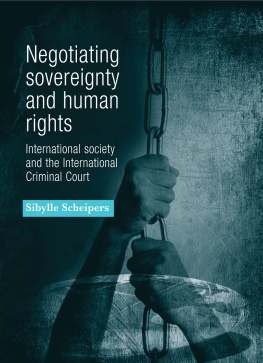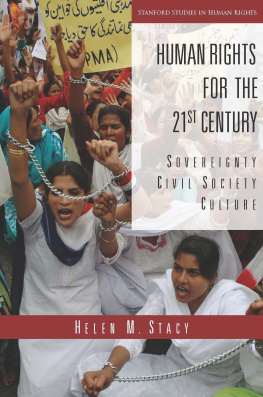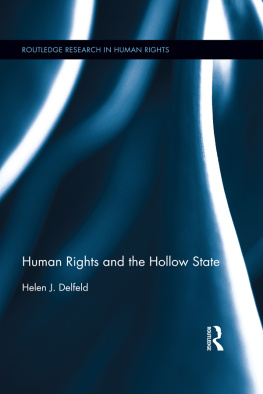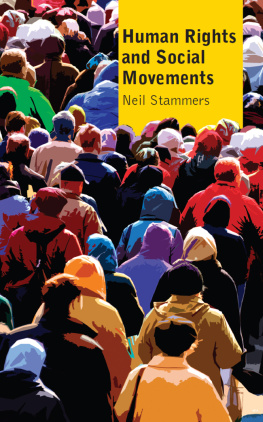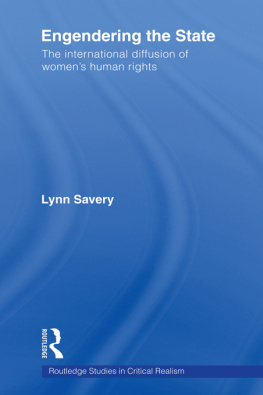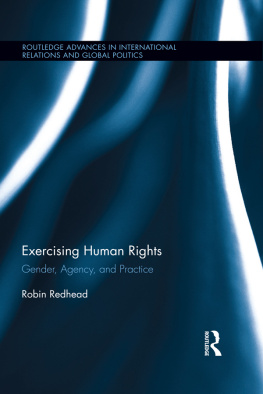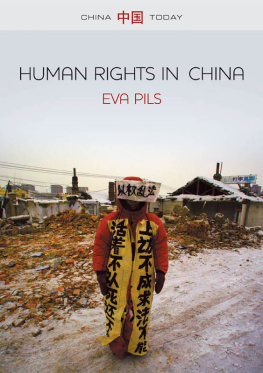Sovereignty, State Failure and Human Rights
This book argues that the effectiveness of the state apparatus is one of the crucial variables determining human rights conditions, and that state weakness and failure is responsible for much of the human rights abuses we see today. Weak states are unable to control their own agents or to police abuses by private actors, resulting in less accountability and more abuse. By contrast, stronger states have greater capacities to protect human rights; even strong authoritarian states tend to have better human rights conditions than weak ones.
The first two chapters of the book develop the theoretical connections between international law, sovereignty, states and rights, and the consequences of state failure for these relationships. The empirical chapters (Chapters 36) test the validity of these theoretical claims, employing a multi-method approach that combines quantitative and qualitative methods. Englehart uses case studies of Afghanistan, Burma/Myanmar and the Indian state of Bihar to analyze types and patterns of state failure, based on analysis of NGO reports, archival research, primary and secondary texts, and interviews and field research.
Examining what happens to human rights when states fail, the book concludes with implications for scholars and activists concerned with human rights. This book will be of great use to scholars of international relations, comparative politics, human rights law and state sovereignty.
Neil A. Englehart is Associate Professor in the Department of Political Science at Bowling Green State University, USA.
Routledge Studies in Human Rights
Series Editors:
Mark Gibney
UNC Asheville, USA
Thomas Gammeltoft-Hansen
The Danish Institute for Human Rights, Denmark
and
Bonny Ibhawoh
McMaster University, Canada
https://www.routledge.com/series/RSIHR
The Routledge Human Rights series publishes high quality and cross-disciplinary scholarship on topics of key importance in human rights today. In a world where human rights are both celebrated and contested, this series is committed to create stronger links between disciplines and explore new methodological and theoretical approaches in human rights research. Aimed towards both scholars and human rights professionals, the series strives to provide both critical analysis and policy-oriented research in an accessible form. The series welcomes work on specific human rights issues as well as on cross-cutting themes and institutional perspectives.
1 Human Rights and the Dark Side of Globalisation
Transnational Law Enforcement and Migration Control
Edited by Thomas Gammeltoft-Hansen and Jens Vedsted-Hansen
2 A Genealogy of the Torture Taboo
Jamal Barnes
3 Sovereignty, State Failure and Human Rights
Petty Despots and Exemplary Villains
Neil A. Englehart
4 Understanding Statelessness
Edited by Tendayi Bloom, Katherine Tonkiss and Phillip Cole
First published 2017
by Routledge
2 Park Square, Milton Park, Abingdon, Oxon OX14 4RN
and by Routledge
711 Third Avenue, New York, NY 10017
Routledge is an imprint of the Taylor & Francis Group, an informa business
2017 Neil A. Englehart
The right of Neil A. Englehart to be identified as author of this work has been asserted by him in accordance with sections 77 and 78 of the Copyright, Designs and Patents Act 1988.
All rights reserved. No part of this book may be reprinted or reproduced or utilised in any form or by any electronic, mechanical, or other means, now known or hereafter invented, including photocopying and recording, or in any information storage or retrieval system, without permission in writing from the publishers.
Trademark notice: Product or corporate names may be trademarks or registered trademarks, and are used only for identification and explanation without intent to infringe.
British Library Cataloguing-in-Publication Data
A catalogue record for this book is available from the British Library
Library of Congress Cataloging-in-Publication Data
A catalog record for this book has been requested
ISBN: 978-1-138-22226-7 (hbk)
ISBN: 978-1-315-40822-4 (ebk)
Typeset in Times New Roman
by Apex CoVantage, LLC
This book is dedicated to Nathan and Andy.
Many people and institutions have helped me in writing this book, through conversation, criticism and moral and financial support. The greatest debt I owe to Melissa Miller, who has read the entire manuscript more than once and helped me find the time to write. I am particularly indebted to Paul Barclay, Brenda Chalfin, David Cingranelli, Clifford Geertz, John Gerring, Jack Goldstone, Shaibal Gupta, Atul Kohli, Michael Johnston, Charles Kurzman, Victor Magagna, Steven Poe, Josh Sanborn, Marc Simon, Harvey Starr, Arun Swami and Michael Walzer for reading chapters and/or discussing core ideas. This book was started on a fellowship at the Institute for Advanced Study, and I am grateful for the informal group on corruption for stimulating discussions that shaped its basic form. I have also benefited from a sabbatical from Bowling Green State University and additional support from the Institute for Cultural Studies.
The late 1980s and early 1990s were a time of triumph for human rights and civil society, as authoritarian governments in Eastern Europe collapsed in the face of popular opposition and were replaced by more democratic regimes. It was also a terrible time for human rights, as collapsing authoritarian governments in places like Afghanistan, Burma, the Democratic Republic of Congo, Liberia, Sierra Leone and Somalia precipitated decidedly uncivil factional violence. Crudely put, where the state was strong, these transitions wrought improvements in human rights conditions, and where it was weak they did not.
The disparity reflects something profound about the relationship between states and rights. It is a commonplace in the human rights literature that states are both the primary threats to human rights and the primary protectors of human rights. Much energy has been poured into examining the first part of this proposition, but surprisingly little into the second.
My central argument in this book is that the effectiveness of the state apparatus is one of the crucial variables determining human rights conditions. The incidence of abuse is much greater in weak and failing states because leaders are less able to control agents of the state and private actors. This leads to less accountability for abuses, and therefore more abuse. This is true even in authoritarian states, where rulers would generally prefer to focus repression narrowly against their opponents, but can do so only when the institutions they work through are able to accurately determine which individuals are most important in the opposition and effectively target them. Scholars and activists should therefore focus not only on the human rights policies leaders adopt, but also the capacities of states to make those policies effective.
The strategy employed here is to examine what happens to human rights when states fail. The state is often implicitly treated as a constant in the human rights literature, despite evidence that the quality and effectiveness of the state apparatus varies tremendously. These variations can have significant impact on patterns of human rights abuse. Understanding these patterns is, I argue, at least as important for explaining abuse as the motivations of governments.



